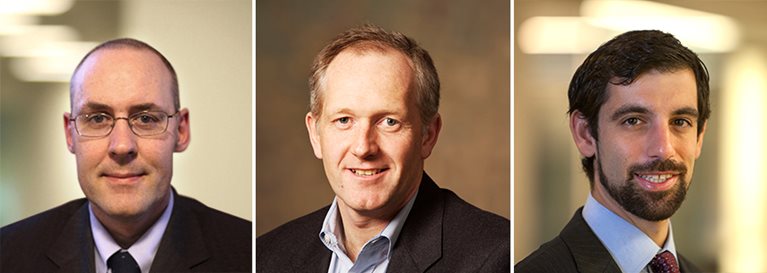There are close to 100 McKinsey consultants who could be described as being obsessed with food. As members of our Agriculture Practice, they spend their time thinking about ways to make food taste better, cost less, last longer, and be healthier. They research and identify opportunities for investment, including the 20-plus global agriculture hot spots outlined in our latest report. They help feed the ever increasing global population by advising farmers, food processors, and others on how to make land more productive and food more available. Among their numbers are meteorologists, chemists, veterinarians, financial analysts, data geeks—and even foodies.
Ludovic Meilhac
Ludovic knows a lot about boysenberries. And cashews. And corn. But his real expertise is milk, knowledge developed during 13 years at Danone in France and North America—first on the manufacturing side, and then in sourcing. Today he works with our clients on sourcing ingredients and managing their food operations and supply chains.
"Milk looks simple. It's liquid. It's white. You can distill it into many products," he says. "But you have no control over the cows—so you are managing an unpredictable supply with fluctuating demand for an ever increasing number of dairy products. This perpetual imbalance makes it always interesting."
Adding to the pressure is time: raw milk has a storage life of 24 to 48 hours, or it has to be thrown out. Processing milk used to be a straightforward choice—regular or skim? Today, there are some 100-plus variations, with different levels of fat, calcium, protein, preservatives, flavors, and more. Dairy producers need to make increasingly complex decisions in shorter and shorter time frames.
"We do not have a crystal ball, but what we can do is help our clients instill greater flexibility into their recipes, supply chains, and other systems," says Ludovic, "so they can plan for and react faster to external forces such as fluctuating consumer preferences, weather changes, volatile commodity markets, and pricing pressures. They have more options." Ludovic has also organized a network of resources that spans our Agriculture, Operations, Retail, and Consumer Practices. We can quickly mobilize, providing experts, knowledge, tools and resources to help clients improve their food operations.

Lutz Goedde
Born and raised in Germany, Lutz grew up working on dairy farms, milking cows, and riding horses—while playing professional volleyball on the side—and pursued advanced degrees in agricultural economics.
Early internships in Africa and Central America laid the foundation for his later work in development. "In 1990, I did field trials inspecting crops in South Africa. The country was on the cusp of democracy—apartheid had been abolished, everyone was consumed with politics," he remembers, "and agriculture was critical to the future." Several years later, he did a stint in Costa Rica managing commodity accounts in bananas, coffee, and sugar. He traveled through the subsistence farms where families were living in poverty. "Both experiences made a profound impression on me."
With a new MBA in hand, Lutz worked with McKinsey's agribusiness clients for 4 years before taking a "crazy offer" to turn around a cattle-genetics company. When it returned to financial health several years later, he headed for the hills, climbing and skiing mountains in the Canadian Rockies.
A call came out of the blue from Sunil Sanghvi, who leads McKinsey's Agriculture Practice, inviting him to a meeting with a leading foundation. That 3-hour brainstorming session led to a number of projects over the next 5 years, where Lutz initially led the team helping the organization formulate its agricultural-development program and later joined the foundation's leadership team in global development. Today, the foundation invests more than $1 billion annually in development initiatives in sub-Saharan Africa and South Asia.
Lutz serves a number of core clients in North America and Asia, including agricultural-input businesses such as seed, irrigation, and fertilizer companies. He helps investors identify opportunities for growth, as outlined in our newest report, pointing out that agriculture has outperformed most sectors since 2006.
He sees the biggest global challenge of today as one of ensuring that the food supply keeps pace with demand. If current trends continue, by 2050, the demand for calories worldwide will rise by 70 percent. Demand for crops for human and livestock consumption will jump by 100 percent. How can we feed the nine billion people who will be living on our planet? Food security—ensuring that all people have access to nutritious, safe food—is an issue that all sectors of the food and agriculture industries are facing. Two possible solutions, says Lutz, are increasing output through technology and innovation and selectively bringing more land into production, for example, in Africa.
David Fiocco
One way to increase agricultural productivity is through data. Traditionally, much of the decision making in farming has been done by intuition and gut instinct. David wants to change that by applying data and analytics to agriculture, 25 kilometers of land at a time.
David is an agricultural-development expert and a former Fulbright Scholar who studied postconflict agricultural networks in Sierra Leone. More recently, he leads the development of a new McKinsey software solution dubbed ACRE—or Agriculture Commodity Research Engine. It applies agronomic data to land maps anywhere in the world so that users can make smarter decisions about planting crops at a very local level. Government agencies can use ACRE to decide which crop initiatives to invest in. Food companies can use it to source raw ingredients more effectively. "Mapping software revolutionized the way we travel and use location data," David said, "and ACRE is changing the way we use data to improve agricultural output."
The bottom line is the urgent need to improve agricultural productivity. "If we can apply the full potential of our resources to agriculture, we can more effectively feed millions of hungry kids and adults," says Lutz. "It doesn't get any more basic than that."
Learn more about our Agriculture Practice.
Read a case study of our work in agricultural development.